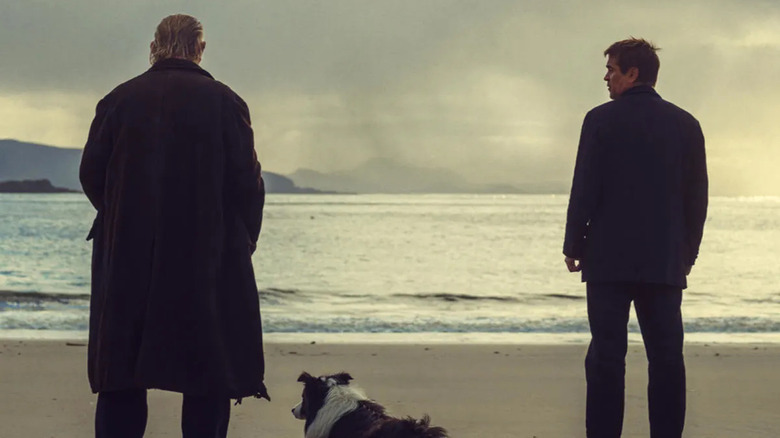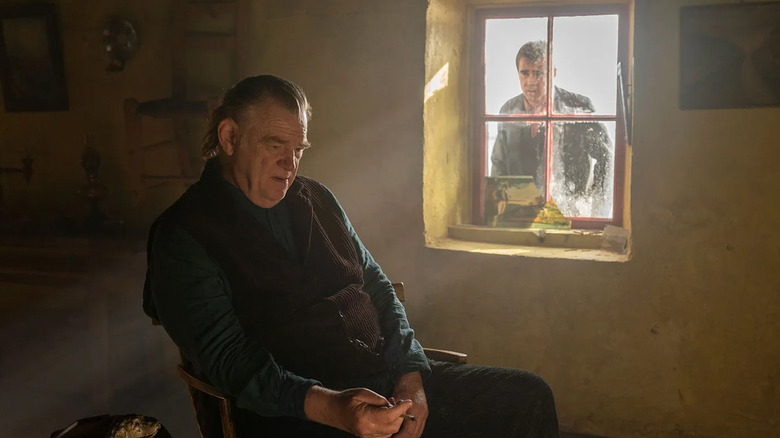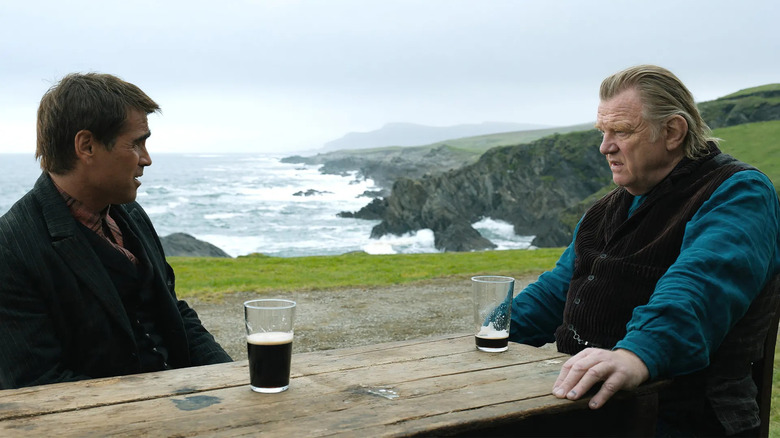How's The Despair: The Banshees Of Inisherin And The Emotional Fallout Of Depression [Fantastic Fest]
Spoilers for "The Banshees of Inisherin" follow.
"How's the despair?" the priest asks Colm Doherty (Brendan Gleeson) during confession. Colm replies it's been not so great lately, to which the priest asks: "But you're not going to do anything about it, right?" Colm replies that no, he's not going to do anything about it. And the reply hangs in the air, especially due to the way Gleeson delivers the line, raising his inflection when he states that he won't do anything about it. Because Colm knows his former friend Pádraic Súilleabháin (Colin Farrell) has threatened to burn down his house, with him in it, the next day. In "The Banshees of Inisherin," Colm and Pádraic used to be best friends; drinking buddies who spent nearly every day together. Then, seemingly out of nowhere, Colm decides he no longer wants to be friends with Pádraic. Why? He just doesn't like him anymore, or so he says. But there's more to it. There's a melancholy burning inside Colm, and a sense that his time is running out. That he can't just keep drinking with Pádraic every day. That sooner or later, something has to give.
Depression doesn't only affect the inflicted — it reaches out like misty tendrils from some abandoned graveyard and grabs hold of those around you, smothering them in the process. As someone who suffers from depression, I know this all too well. Many times I've upset friends, and my wife (who has depression of her own) as I spiral down into darkness. I'm not saying my wife gets annoyed or angry at my sadness; I'm saying there's only so much she can do before she starts to despair herself. Depression hangs over "The Banshees of Inisherin," Martin McDonagh's funny, melancholy tale of friendship gone sour. While Colm gives many reasons for abandoning Pádraic, depression seems to be the driving force.
How's the despair?
How's the despair?
Colm grows so adamant that Pádraic leaves him alone that he threatens to cut off his own fingers every time Pádraic attempts to talk to him. And he's not bluffing — he does indeed start chopping off fingers, an extreme form of self-mutilation that coincides with the character's misery. Does he hate Pádraic? No, it doesn't seem so. And there are occasions when he is still kind to his ex-friend. But he also wants his distance. He doesn't want to be alone, he just wants something different.
When you have depression, that never-ending search for something different hangs over you. You want something, anything, to break up the routine. To end your daily sense of grayness; your overwhelming feelings of being hopeless and doomed. An extreme situation could present itself, and you could grasp onto it, just because it seems so new. So fresh. So far removed from the cosmic loneliness that takes hold of your heart. You do stupid things. You cut off your friends. You chop off your fingers.
"The Banshees of Inisherin" is consistently hilarious. Farrell, in particular, has never been better or funnier than he is here. But as Pádraic grows further away from Colm, sadness grips hold of him; an ice-cold glove wrapping itself around his heart. He sits, alone, growing more despondent and alone. If only Colm would forget this feud. But he won't, and, desperate and hurt, Pádraic resolves to fix this by burning Colm's house down. And telling him he's going to do it. Colm has a choice — he can easily leave the house before Pádraic sets it ablaze.
But he won't. As he told the priest, he doesn't intend to deal with his despair by embracing suicide. But that doesn't mean he can't wait for something to come along to kill him. This element broke me in ways I didn't think I could be broken anymore, because it's something I have felt many times. I don't want to stay in this world. I don't want to keep waking up. But I also don't want to kill myself and hurt those around me. However, if death presented itself in some way, I might just embrace it.
God and miniature donkeys
I keep coming back to that confessional scene. During the confession, Colm states that he's saddened by the death of Pádraic's miniature donkey, Jenny. The priest rudely asks if Colm thinks God gives a damn about miniature donkeys.
Colm's reply, which is so perfectly handled by Gleeson with just the right touch of dry, sad humor, is that he hopes that God does care, otherwise what's the point? It's such a loaded, heartbreaking answer, and it expertly tells us so much about Colm. How he's wondering what the overall point of this is. How he's wondering how there can be a loving God if God doesn't give a damn about dead donkeys. How everything hurts.
I'm probably giving you the impression that "The Banshees of Inisherin" is a non-stop misery-fest. It's not. It's just a bittersweet story of hurt people growing apart and questioning what the point of it all is. And that's what life is like, isn't it? Especially if you're depressed. A daily struggle to find an answer to what it all means. Why are we here? Why do we drift away from our friends? Why do we chop off our fingers? Why doesn't God care about the untimely deaths of miniature donkeys?


